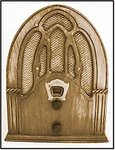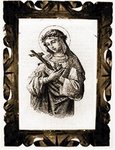 .
.If there is a greater ecumenical work of Christian apologetics than C.S. Lewis' "Mere Christianity", I have not read it. If any atheist/humanist/whateverist with even the slightest open mind were to read it, I dare say I might see them at mass within the year. . . and yes, it is the book given to a certain atheist a dozen years ago which eventually lead him to his knees, his Savior, and the church Christ founded (oh, and started him writing an annoying lil' blog).
The opening page should start like an old pirates warning
"Abandon all un-Hope all ye who enter"
As to it's ecumenical character, it is without a doubt, one of the few books that all of our Christian bretheren can agree on, and even widely promote as first reading (along with the gospels) for any of our wayward friends.
Lewis' own preface beautifully explains this goal:
"I hope no reader will suppose that 'mere' Christianity is here put forward as an alternative to the creeds of the existing communions - as if a man could adopt it in preference to Congregationalism or Greek Orthodoxy or anything else. It is more like a hall out of which doors open into several rooms. If I can bring anyone into that hall I shall have done what I attempted. But it is in the rooms, not in the hall, that there are fires and chairs and meals. The hall is a place to wait in, a place from which to try the various doors, not a place to live in. For that purpose the worst of the rooms (whichever that may be) is, I think, preferable. It is true that some people may find they have to wait in the hall for a considerable time, while others feel certain almost at once which door they must knock at. I do not know why there is this difference, but I am sure God keeps no one waiting unless He sees that it is good for him to wait. When you do get into your room you will find that the long wait has done you some kind of good which you would not have had otherwise. But you must regard it as waiting, not as camping. You must keep on praying for light: and, of course, even in the hall, you must begin trying to obey the rules which are common to the whole house. And above all you must he asking which door is the true one; not which pleases you best by its paint and panelling. In plain language, the question should never be: 'Do I like that kind of service?' but 'Are these doctrines true: Is holiness here? Does my conscience move me towards this? Is my reluctance to knock at this door due to my pride, or my mere taste, or my personal dislike of this particular doorkeeper?'"
Lewis' own preface beautifully explains this goal:
"I hope no reader will suppose that 'mere' Christianity is here put forward as an alternative to the creeds of the existing communions - as if a man could adopt it in preference to Congregationalism or Greek Orthodoxy or anything else. It is more like a hall out of which doors open into several rooms. If I can bring anyone into that hall I shall have done what I attempted. But it is in the rooms, not in the hall, that there are fires and chairs and meals. The hall is a place to wait in, a place from which to try the various doors, not a place to live in. For that purpose the worst of the rooms (whichever that may be) is, I think, preferable. It is true that some people may find they have to wait in the hall for a considerable time, while others feel certain almost at once which door they must knock at. I do not know why there is this difference, but I am sure God keeps no one waiting unless He sees that it is good for him to wait. When you do get into your room you will find that the long wait has done you some kind of good which you would not have had otherwise. But you must regard it as waiting, not as camping. You must keep on praying for light: and, of course, even in the hall, you must begin trying to obey the rules which are common to the whole house. And above all you must he asking which door is the true one; not which pleases you best by its paint and panelling. In plain language, the question should never be: 'Do I like that kind of service?' but 'Are these doctrines true: Is holiness here? Does my conscience move me towards this? Is my reluctance to knock at this door due to my pride, or my mere taste, or my personal dislike of this particular doorkeeper?'"
Lewis was indeed one of the instruments the Holy Spirit used to lead this silly boy into the hall, and to try a few doors, and eventually a nice little Christian adolescence in the Guest House.
to be continued
.
to be continued
.




No comments:
Post a Comment